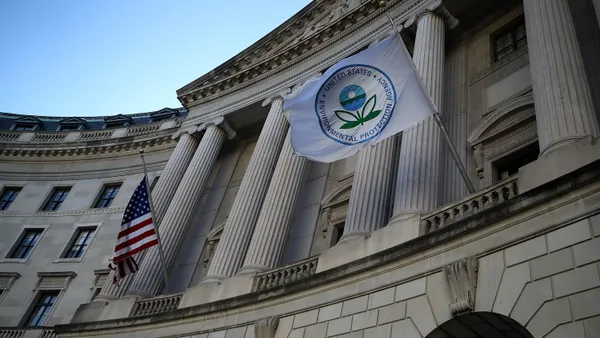Dive Brief:
- The House voted to pass H.R. 3441, known as the Save Local Business Act, by a vote of 242-181 on Nov. 7. This essentially went along party lines, with only a small number of Democrats adding their support.
- H.R. 3441 would reverse a 2015 ruling by the National Labor Relations Board (NLRB) that stated a person or company could be considered a joint employer if it exercised "indirect" control over a subcontractor. Under the bill, that standard would change to read "only if such person directly, actually, and immediately, and not in a limited and routine manner, exercises significant control over the essential terms and conditions of employment."
- Multiple trade associations, including the International Franchise Association, applauded the decision. The National Waste & Recycling Association (NWRA) has also been supportive of the bill. Labor advocacy groups and unions remain strongly opposed, saying this will be harmful to workers because it will not only affect the 2015 NLRB ruling but also change the Fair Labor Standards Act.
Dive Insight:
While this joint employer bill has become a top priority for multiple industries, achieving "key vote" status from both the National Association of Manufacturers and National Retail Federation, the debate originally started at a California recycling facility. The question of whether Browning-Ferris Industries (BFI), a Republic Services subsidiary, has to recognize workers from a staffing agency who voted to unionize eventually led to the 2015 NLRB decision. Legal wrangling has continued for years since, and the workers' decision to organize with a Teamsters local has not been recognized. A decision about this from the D.C. Circuit Court is expected imminently. The NLRB, which now has a Republican majority, could also vote to reverse the 2015 BFI ruling.
Like all of the associations involved, the NWRA has been actively lobbying in support of H.R. 3441, seeing it as possibly the quickest and most decisive way to reverse the 2015 BFI standard. In October, the association told Waste Dive this was important because current standards limited members' ability to work with subcontractors. The NWRA declined to offer specific examples, but disagreed with the notion that this was mainly about temporary workers at MRFs. Many companies rely on staffing agencies to supply temporary labor for volume fluctuations or hiring shortages. While it has been recognized that this can present additional safety challenges, and labor groups view full-time employment as more optimal, the practice is seen as common and acceptable among many in the waste and recycling industry.
At this point, the waste industry has become a minor player in a much larger effort driven by retail and fast food franchise interests. Labor policy specialists and lawyers view McDonalds as a driving force behind H.R. 3441, even though the 2015 BFI ruling didn't explicitly affect franchise operations. Between those lobbying resources, and the House vote momentum, the joint employer bill could garner more attention in the Senate where its chances may be less certain with thinner party margins. Though with the D.C. Circuit Court ruling pending, and the potential for a new NLRB vote, it is still seen as likely that joint employer policy will be changed one way or another.










